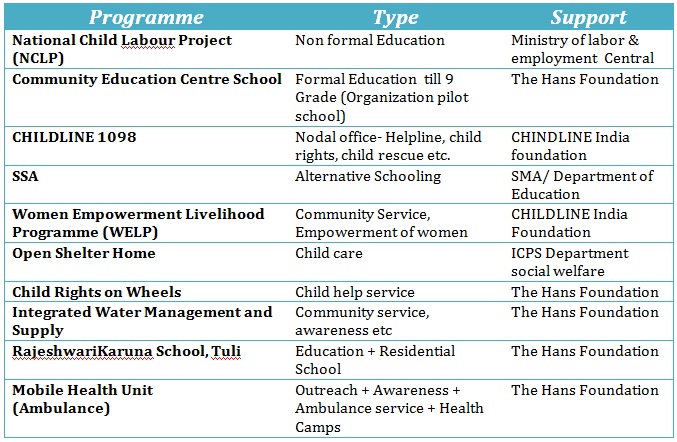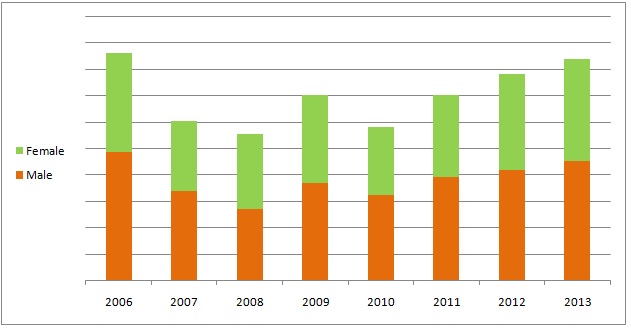INTRODUCTION
Community Educational Centre Society (CECS) is a non-governmental organization working for children, it came into official existence on 10th of April 2001 with the support of World Wide vision, India. Since 2001 CECS has been actively working under the chairmanship of Mr. Subonenba Longkumer, for the welfare of under privileged children, street children, and orphans with its main focus on child labour. Apart from imparting education to such children Community Educational Centre Society has been involved in creating awareness through campaigns, medical camps, life skill training and capacity building trainings. It runs educational programs and rehabilitation centers for all kinds of child related stigma.
The foundation of this organization is its children, for 8 years now CECS has been working
With the media covering CECS campaigns and activities, awareness about the centre’s work and program is getting more visibility in the social sector. CECS is also the Nodal organization for running CHILDLINE 1098 in Dimapur which is a national 24 hour free phone emergency outreach service for children in need of care and protection that aims to link children to long term services, supported by the Union Ministry of Women and Child Development and links state governments, NGO’s, Bilateral/Multilateral agencies, allied systems and sometimes the corporate sector.
With a vision that “Every child is a gift of God to be loved and cared with fullness of life” Community Educational Centre Society (CECS) sets on a mission ‘to seek and transform the lives of vulnerable children through comprehensive educational values, health care and developmental activities that promote and safeguard the rights of the children in the community’. In a campaign CECS challenged the youth to rise against Child labour and abuse discrimination of children, so that in the next 10-15 years Nagaland will be a ‘Child labour free state’. So holding on to that hope of a ‘future without child labour’ CEC society is working its way to reach the goal.
Since then starting from 2011 the organization has ventured from
advocating child rights issues and imparting education,
to community development for rural Nagaland and women empowerment
to support the need of tribal women through livelihood programme.
Our organization targets to help women to be the builder of their homes by empowering them through the women livelihood programme under RajeswariKarunaRozgarYojana, to help unemployed, widowed, economically unstable and dependent women.
ACHIEVEMENTS REVIEW
Over the years Community Education Centre Society has helped bring some visible changes in the society, our attempt to help the children and the society in whole has been supported and backed by many. In a brief attempt to review some of the achievements, here are some of the highlights of CECS:





Till
Date (Provide with centre & number of children enrolled)

7) Sarva Shiksha Abhiyan (SSA): Sarva Shiksha Abhiyan (SSA) is Government of India's flagship programme for achievement of Universalization of Elementary Education (UEE) in a time bound manner, as mandated by 86th amendment to the Constitution of India making free and compulsory Education to the Children of 6-14 years age group, a Fundamental Right. CECS started the SSA programme in the year 2008.
A brief report on Out of School Children(OoSC)/never enrolled in DMC area conducted by Community Educational Centre Society (CECS) 2012.
During the survey some points that came to
light through information given by children and parents as to why most children
are out of school or never enrolled. Some of the major factors were:
a) Poverty:
One of the biggest and the main reason or stigma for which students cannot go
to school is because of poverty. In this situation parents cannot afford to
send their children to school because of the lack of money. They cannot afford
their fees and books as a result of which they are forced to drop out from
school. As a result children are forced to work in order to earn their living
at an early stage to support their parents and contribute to their family
income so as to make both ends meet.
b)
Neglect:
Lack of self interest in studies is another reason for many drop outs. Some of
the parents don’t look after their own children or pay attention by giving time
or spending time with them and as a result of which the children go astray.
Even if the child is enrolled in schools the parents neglect the importance of
their child’s education and as a result of these children lose interest in
their studies and drop out of schools. Most
parents are illiterate and therefore unaware of the importance of child
education.
c)
Abandoned or Orphaned: Another reason is that some of the children are left
abandoned by their parents. There have been some cases where one of the parents
dies and the other one get remarried as a result of which their new step father
or step mother ignores the child and his/her needs and for which the child
finally lands up in labour work to earn his/her
livelihood at a young age leaving them with less option and no other
opportunity. Another reason is due to the death of both the biological parents
of the child when there is no one to look after the child or leaving the child
with uncaring family members. For this reason the child ends up leaving school
and just remains idle or even starts labouring in
order to earn his living.
d)
Unavailability of seats in Government institutions: When parents cannot afford to send the children to private schools.
The Government schools are already full and there are no vacant seats to admit
more children so some of the children are just left without getting admitted.
e)
Homeless: Some families
dwelling in undeveloped areas become victims of natural calamities like fire,
flood etc. leaving them homeless, children of these families drop out of schools.
Their circumstances leave them financially crippled. Most of the municipal areas
get flooded during summer and during which many children lose their books and
uniforms and their belongings which is also a factor in dropping out of school.
f)
Early responsibilities: Some of the parents are daily wage labourers
and go to work every day daily in the morning and come back late at night. Children
whose parents are daily wage laboures tend to take
family responsibilities like looking after the young ones and their homes
leading to missed opportunities.
SSA
(Enrollment Chart………)
8) RAJESHWARI
KARUNA SCHOOL, TULI: “Upcoming
infrastructure”
With the vision to
bring the underprivileged from & around the tribal and rural areas of
Nagaland and borders of Assam, Community Educational Centre Society with the
help and support from ‘The Hans Foundation’ has set out to build a residential
school for poor and underprivileged. The aim is to provide hostels and
residential schooling for under privileged children with the best schooling
infrastructure & deliver proper facilities needed for a high quality
education.
This project is intended to benefit the underprivileged tribal children in the rural areas. Given our location and plan of a fully residential/day school in a potentially growth area, it will benefit quite a number of tribal children from neighboring state of Assam too. The school has the potential to develop into a model school which can be replicated by others thereby benefiting more underprivileged children in the near future.
|
Project Goal |
Ensuring right to Education to deprived rural
children with special emphasis on “Girl Child” in Tuli
area under Mokokchung District and 5 other
adjoining district of Nagaland State and adjoining neighboring state of Assam
through integration of support system and responsive community action. |
|
Outcome 1 |
Children have hope and vision for the future |
|
Outcome 2 |
Quality education for 300 students delivered through creation of
students friendly learning spaces |
|
Outcome 3 |
Increased access
to various top rated educational/technical institutions |
|
Outcome 4 |
Child age specific PTA members trained on school management |
|
Outcome 5 |
Infrastructure
development for providing standardized education |
9) Open
Shelter Home: In 2007 CECS started Night shelter intended as a temporary home for homeless children, it was renamed as ‘Open Shelter Home’ in the year 2011. At present shelter home is
being operated under CECS with support from Integrated Child Protection Scheme ICPS, a centrally sponsored scheme aimed at building a protective environment
for children in difficult circumstances, as well as other vulnerable children. Presently Open Shelter Home is running
successfully, it has a seat intake to shelter 25 children. The home is for:
ü Child in need for care
ü Homeless children
ü Runaway children
ü Street children, etc.
With
exception for children in conflict with law
Main focus:
-
To rehabilitate
children in need
-
Providing
needful means/amenities to children
-
Given
care and also imparting non-formal education
-
Provide counseling and health
care system
Ø provide health awareness camp, in rural and
inaccessible/remote villages of the district
Ø act and provide ambulance services to areas
that are far from health clinics/ main district hospitals
Ø conduct in-depth study on the areas and the
kind of diseases prevalent in their areas
Ø to ensure that the studies conducted are
fully recorded and taking measurable steps to combat them
Ø act as agents to record the studies taken
from the areas covered and promote their stories
The center will act as
Ø Clinic
centre for nearby villages and Districts
Ø The
head centre for ‘Mobile heath Units’
Ø It
will act as the missionary for villages by reaching to the roots and the
finding prevalent and pressing health issues faced by the community
Ø The
target will be women and child related issues on importance like: Child birth,
Maternity, Nutrition and other women and child related issues.
Ø Deploy
health units to provide health care and necessary facilities/medicines needed
according to the findings.
For more than 8 years
CECS has involved itself in working with promotion of education and awareness
towards child rights. The organization has conducted occasional “health camps” inside the school campuses,
we also conduct awareness on sanitation and cleanliness in and around the
school area.
Our
main objective through this programme will be:
a.
To
reach rural masses with poor health facilities
b.
Train functionaries
who will act as volunteers to spread awareness during health camps
c. To discover and bring to light the areas/districts that
are afflicted to the poorest health facilities
d. Access to public health services such as Women’s health,
child health, water, sanitation & hygiene, immunization, and Nutrition.
e. Promotion of healthy lifestyles
End Note: There have been constant changes in the activities of the organization,
since CECS has gone through positive measure of changes both functional as well
as social outputs. The organization’s aim to bring changes in society is gradually taking its
steps to success.
Our main focus being women and
child, CECS is named as one of the pioneer organization to advocate child
rights in and around the state. We as an organization believe that ‘every opportunity comes with a chance, to
make the change we want to see’. Therefore we hope to work with that belief
and a positive attitude
Designed & Developed by GeekGarage
Recommended browser: Chrome & Mozilla & IE9
Resolution: 1024 x 768 & above